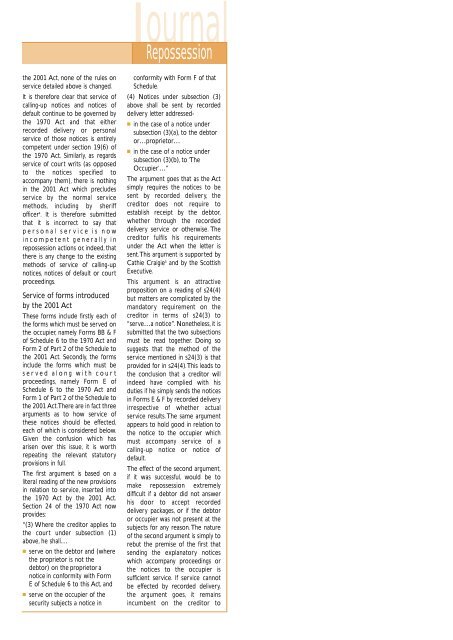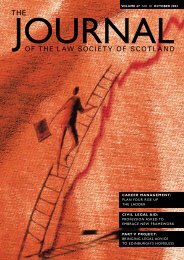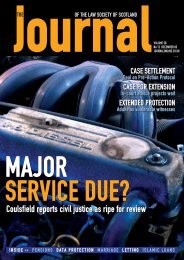OF THE LAW SOCIETY OF SCOTLAND - The Journal Online
OF THE LAW SOCIETY OF SCOTLAND - The Journal Online
OF THE LAW SOCIETY OF SCOTLAND - The Journal Online
Create successful ePaper yourself
Turn your PDF publications into a flip-book with our unique Google optimized e-Paper software.
the 2001 Act, none of the rules on<br />
service detailed above is changed.<br />
It is therefore clear that service of<br />
calling-up notices and notices of<br />
default continue to be governed by<br />
the 1970 Act and that either<br />
recorded delivery or personal<br />
service of those notices is entirely<br />
competent under section 19(6) of<br />
the 1970 Act. Similarly, as regards<br />
service of court writs (as opposed<br />
to the notices specified to<br />
accompany them), there is nothing<br />
in the 2001 Act which precludes<br />
service by the normal service<br />
methods, including by sheriff<br />
officer4 . It is therefore submitted<br />
that it is incorrect to say that<br />
personal service is now<br />
incompetent generally in<br />
repossession actions or, indeed, that<br />
there is any change to the existing<br />
methods of service of calling-up<br />
notices, notices of default or court<br />
proceedings.<br />
Service of forms introduced<br />
by the 2001 Act<br />
<strong>The</strong>se forms include firstly each of<br />
the forms which must be served on<br />
the occupier, namely Forms BB & F<br />
of Schedule 6 to the 1970 Act and<br />
Form 2 of Part 2 of the Schedule to<br />
the 2001 Act. Secondly, the forms<br />
include the forms which must be<br />
served along with court<br />
proceedings, namely Form E of<br />
Schedule 6 to the 1970 Act and<br />
Form 1 of Part 2 of the Schedule to<br />
the 2001 Act.<strong>The</strong>re are in fact three<br />
arguments as to how service of<br />
these notices should be effected,<br />
each of which is considered below.<br />
Given the confusion which has<br />
arisen over this issue, it is worth<br />
repeating the relevant statutory<br />
provisions in full.<br />
<strong>The</strong> first argument is based on a<br />
literal reading of the new provisions<br />
in relation to service, inserted into<br />
the 1970 Act by the 2001 Act.<br />
Section 24 of the 1970 Act now<br />
provides:<br />
“(3) Where the creditor applies to<br />
the court under subsection (1)<br />
above, he shall…<br />
■ serve on the debtor and (where<br />
the proprietor is not the<br />
debtor) on the proprietor a<br />
notice in conformity with Form<br />
E of Schedule 6 to this Act, and<br />
■ serve on the occupier of the<br />
security subjects a notice in<br />
<strong>Journal</strong><br />
Repossession<br />
conformity with Form F of that<br />
Schedule.<br />
(4) Notices under subsection (3)<br />
above shall be sent by recorded<br />
delivery letter addressed-<br />
■ in the case of a notice under<br />
subsection (3)(a), to the debtor<br />
or…proprietor…<br />
■ in the case of a notice under<br />
subsection (3)(b), to ‘<strong>The</strong><br />
Occupier’…”<br />
<strong>The</strong> argument goes that as the Act<br />
simply requires the notices to be<br />
sent by recorded delivery, the<br />
creditor does not require to<br />
establish receipt by the debtor,<br />
whether through the recorded<br />
delivery service or otherwise. <strong>The</strong><br />
creditor fulfils his requirements<br />
under the Act when the letter is<br />
sent.This argument is supported by<br />
Cathie Craigie5 and by the Scottish<br />
Executive.<br />
This argument is an attractive<br />
proposition on a reading of s24(4)<br />
but matters are complicated by the<br />
mandatory requirement on the<br />
creditor in terms of s24(3) to<br />
“serve…a notice”. Nonetheless, it is<br />
submitted that the two subsections<br />
must be read together. Doing so<br />
suggests that the method of the<br />
service mentioned in s24(3) is that<br />
provided for in s24(4).This leads to<br />
the conclusion that a creditor will<br />
indeed have complied with his<br />
duties if he simply sends the notices<br />
in Forms E & F by recorded delivery<br />
irrespective of whether actual<br />
service results. <strong>The</strong> same argument<br />
appears to hold good in relation to<br />
the notice to the occupier which<br />
must accompany service of a<br />
calling-up notice or notice of<br />
default.<br />
<strong>The</strong> effect of the second argument,<br />
if it was successful, would be to<br />
make repossession extremely<br />
difficult if a debtor did not answer<br />
his door to accept recorded<br />
delivery packages, or if the debtor<br />
or occupier was not present at the<br />
subjects for any reason. <strong>The</strong> nature<br />
of the second argument is simply to<br />
rebut the premise of the first that<br />
sending the explanatory notices<br />
which accompany proceedings or<br />
the notices to the occupier is<br />
sufficient service. If service cannot<br />
be effected by recorded delivery,<br />
the argument goes, it remains<br />
incumbent on the creditor to










